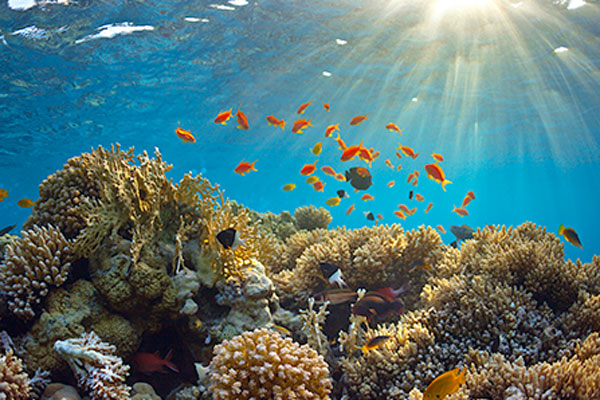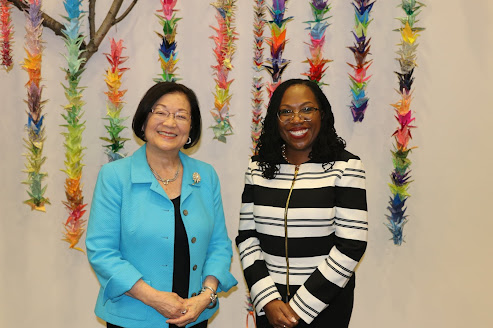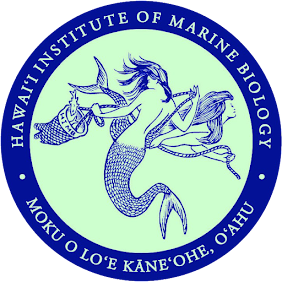SEN. MAZIE HIRONO GAVE OPENING REMARKS ON CONFIRMATION OF U.S. SUPREME COURT NOMINEE KETANJI BROWN JACKSON on Monday. Hirono highlighted Jackson's extensive professional qualifications, her personal background, and the historic nature of her nomination to be the first Black woman ever to serve on the Supreme Court.
"Your experiences and your background as a trial court judge, a public defender, a mother, a Black woman, and so much more—provide you with a uniquely different perspective than any of the eight other Justices on the Court," said Hirono. "Like your mentor Justice Breyer, I know you will engage with the other justices—both liberal and conservative to share these perspectives, challenge their views, and shape the Court's direction for the better. With the personal and professional diversity you bring, you will expand the experience and knowledge of the Court and the decisions the Court makes will be better as a result."
Hirono also spoke to Jackson's track-record as a fair and impartial jurist with a commitment to the Constitution and the rule of law. "You are an accomplished jurist, having issued nearly 600 opinions that demonstrate a clear, even-handed approach to the law," Hirono continued. "You have sided with workers and with employers, for and against the government, and for prosecutors and for criminal defendants."
Hirono said,
"Former D.C. Circuit Judge Thomas Griffith, a George W. Bush appointee, summed it up best when he said you 'will adjudicate based on the facts and the law and not as a partisan.' Having reviewed your record, I strongly agree with that statement."
Hirono's full remarks can be viewed at https://www.youtube.com/watch?v=GP3Ifh3S8ms.
A statement from Hirono's office noted that Jackson has many accomplishments throughout her life and career: national champion in speech and debate as a high schooler; undergraduate and law degrees from Harvard—each with honors; three clerkships in federal court, including one at the Supreme Court for Justice Breyer, the retiring judge she would replace; an accomplished career as a lawyer at the trial and appellate level, both in private practice and as a public defender; two stints at the U.S. Sentencing Commission, including as Vice Chair; nine years as a federal judge—first in the D.C. District Court and then on the D.C. Circuit Court of Appeals.
To read comments, add your own, and like this story, see www.facebook.com/kaucalendar/. See latest print edition at www.kaucalendar.com. See upcoming events at https://kaunewsbriefs.blogspot.com/2022/03/upcoming-events-for-kau-and-volcano.html
MAYOR MITCH ROTH INVITES STUDENTS TO ENTER THE YOUNG ARTISTS AND AUTHORS SHOWCASE. It is an annual contest that encourages youth worldwide to express the mission of Sister Cities International through original artwork, literature, photography, and music. This year's theme is Generation Rescue: Sustainable Water for All. Deadline for submission is April 1.
The County of Hawaiʻi is a member of Sister Cities International, which aims to promote peace through mutual respect, understanding, and cooperation – one individual, one community at a time. Submissions are centered around an annual theme and judged based on creativity, composition, and theme interpretation. A statement from the mayor's office says, "Sustainable Water for All, given climate change, has become an undeniably harsh reality in our lives, making the importance of raising awareness and taking action more essential every day. As temperatures rise, water patterns are disrupted, ecosystems are disturbed, cultures are affected, and energy resources are proven to be unsustainable for long-term use. "These ongoing changes impact our local and global communities in every aspect, and youth are the key to tackling this global reality."
The mayor said, "Participating in this contest will be a great opportunity for our young artists to showcase their skills while simultaneously promoting the conservation of our precious water resources. We have a lot of really great talent here on our island, and we are excited to share that talent with the world."
Selected grand prize winners in each category will win a $1,000 prize, second place winners will win $250, and third place winners will be awarded $100. In addition, winners' artwork will be displayed on the Sister Cities Website after the winners are announced during the Youth Leadership Summit. There is NO fee to submit an entry to YAAS at the national office. Students must be 13-18 years old to participate. Students interested in participating should call Jane Clement, Sister Cities Protocol Officer for the County of Hawaiʻi, at 323-4441. More information is available at www.sistercities.org.
Funding of $900,000 will go to a new post-harvest processing facility at MAʻO Organic Farms, a UH partner, to provide more locally produced foods in the community while expanding their youth internship program, training and other educational opportunities through UH.
SEE UPCOMING EVENTS IN KAʻŪ & VOLCANO
"Former D.C. Circuit Judge Thomas Griffith, a George W. Bush appointee, summed it up best when he said you 'will adjudicate based on the facts and the law and not as a partisan.' Having reviewed your record, I strongly agree with that statement."
Hirono's full remarks can be viewed at https://www.youtube.com/watch?v=GP3Ifh3S8ms.
A statement from Hirono's office noted that Jackson has many accomplishments throughout her life and career: national champion in speech and debate as a high schooler; undergraduate and law degrees from Harvard—each with honors; three clerkships in federal court, including one at the Supreme Court for Justice Breyer, the retiring judge she would replace; an accomplished career as a lawyer at the trial and appellate level, both in private practice and as a public defender; two stints at the U.S. Sentencing Commission, including as Vice Chair; nine years as a federal judge—first in the D.C. District Court and then on the D.C. Circuit Court of Appeals.
To read comments, add your own, and like this story, see www.facebook.com/kaucalendar/. See latest print edition at www.kaucalendar.com. See upcoming events at https://kaunewsbriefs.blogspot.com/2022/03/upcoming-events-for-kau-and-volcano.html
MAYOR MITCH ROTH INVITES STUDENTS TO ENTER THE YOUNG ARTISTS AND AUTHORS SHOWCASE. It is an annual contest that encourages youth worldwide to express the mission of Sister Cities International through original artwork, literature, photography, and music. This year's theme is Generation Rescue: Sustainable Water for All. Deadline for submission is April 1.
The County of Hawaiʻi is a member of Sister Cities International, which aims to promote peace through mutual respect, understanding, and cooperation – one individual, one community at a time. Submissions are centered around an annual theme and judged based on creativity, composition, and theme interpretation. A statement from the mayor's office says, "Sustainable Water for All, given climate change, has become an undeniably harsh reality in our lives, making the importance of raising awareness and taking action more essential every day. As temperatures rise, water patterns are disrupted, ecosystems are disturbed, cultures are affected, and energy resources are proven to be unsustainable for long-term use. "These ongoing changes impact our local and global communities in every aspect, and youth are the key to tackling this global reality."
The mayor said, "Participating in this contest will be a great opportunity for our young artists to showcase their skills while simultaneously promoting the conservation of our precious water resources. We have a lot of really great talent here on our island, and we are excited to share that talent with the world."
Selected grand prize winners in each category will win a $1,000 prize, second place winners will win $250, and third place winners will be awarded $100. In addition, winners' artwork will be displayed on the Sister Cities Website after the winners are announced during the Youth Leadership Summit. There is NO fee to submit an entry to YAAS at the national office. Students must be 13-18 years old to participate. Students interested in participating should call Jane Clement, Sister Cities Protocol Officer for the County of Hawaiʻi, at 323-4441. More information is available at www.sistercities.org.
To read comments, add your own, and like this story, see www.facebook.com/kaucalendar/. See latest print edition at www.kaucalendar.com. See upcoming events at https://kaunewsbriefs.blogspot.com/2022/03/upcoming-events-for-kau-and-volcano.html
 |
| The Education for Native Hawaiians Program at U.H. will receive $38.9 million. Photo from U.H. |
HUNDREDS OF MILLIONS OF DOLLARS IN FEDERAL FUNDING was recently approved by congress for the ten-campus University of Hawai'i system. Its research program alone will receive $500 million. Congressman Ed Case said today that not only is U.H. "our flagship institution of higher education," it has been "regularly ranked as one of the top research universities in the world.”
U.H. Pres. David Lassner’s recent report to the UH Board of Regents referred to the federal funding as "an excellent year for UH." He thanked Hawai‘i's Congressional delegation "all of whom have been actively working on behalf of the State of Hawai‘i and the University of Hawai‘i with programs that will really help us serve our communities on every island.”
Lassner also reported that UH was on track to a record-breaking research funding year, with $397 million year-to-date and a projected $500 million total.”
H.R. 2471, the Consolidated Appropriations Act 2022, was passed by Congress and signed into law by the President earlier this month. Provisions of specific relevance to UH funding include: Low-income and Minority Serving Institutions; the maximum Pell Grant award, increased by $400, to $6,895, for the 2022–23 academic year, the biggest increase to the Pell maximum in more than a decade; $10.9 million for the Strengthening Asian American and Native American Pacific Islander-Serving Institutions program, a $5.8-million increase from federal Fiscal Year (FY) 2021, which runs from Oct. 1, 2021 to Sept. 30, 2022.
Other federal programs received increases including the Supplemental Educational Opportunity Grant, Federal Work Study, TRIO, GEAR UP and the Graduate Assistance in Areas of National Need programs. Funding of $38.9 million will go for the Education for Native Hawaiians program, an increase of $1.5 million from FY 2021; and $4 million for the U.S. Department of Agriculture’s Education Grants for Alaska Native and Native Hawaiian Institutions program, an increase of $806,000 from FY 2021, the first increase the program has received in years.
A $5 million increase goes to the National Aeronautics and Space Administration’s Minority University Research and Education Project, which has been directed to utilize funds to connect science, Indigenous culture and community at minority-serving higher education institutions, including Native Hawaiian-serving institutions. A $1 million increase, for a total of $3 million, was provided for the Center for Indigenous Innovation and Health Equity, a partnership between UH, Oklahoma State University and the University of Alaska. The measure encourages Office of the Director in the National Institutes of Health to prioritize the research needs of Native Hawaiians and to partner with entities that have a proven record of working closely with Native Hawaiian communities and organizations to allow for the development of NIH researchers.
UH Programs include $1 million for the UH Hilo ʻImiloa Astronomy Center for the Hale Pōhaku Exhibition and Planetarium Expansion; $1 million for Asia-Pacific Microgrid Development and Training through Hawaiʻi Natural Energy Institute, a unit of the UH Mānoa School of Ocean and Earth Science and Technology; $1 million for a Strategic Center for Indo-Pacific Studies in the UH Mānoa School of Pacific and Asian Studies; and $1 million for a Rural Health Research Center in the UH System Office of Strategic Health Initiatives.
 |
| 'Imiloa will receive $1 million for its Hale Pōhaku Exhibition and Planetarium Expansion. Photo from U.H. |
Funding of $200,000 for the Hawaiʻi Institute of Marine Biology, a unit of UH Mānoa SOEST, for the Nature-Based Coral Reef Features for Coastal Protection project.
The act also funds a $3-million increase for the U.S. Geological Survey Volcano Hazards Program, which provides continuing support to the UH Hilo Center for the Study of Active Volcanos; a $7-million increase for the Energy Transitions Initiative, which helps remote and island communities design their own resilience and clean energy solutions; and $2.5-million increase in the Alternative Energy Research program, which supports the UH Hawaiʻi Natural Energy Institute and climate resiliency work in SOEST.
Funding of $7.5 million will go for a new program called Resilient Innovative Sustainable Economies via University Partnerships will support a collaboration between universities in isolated and island states with expertise in energy, marine and blue economy technologies to diversify their state economies.
Funding of $1.2 million will go to coffee leaf rust research; and $1 million for science-based pest management strategies for invasive insect species that affect tropical grazing lands.
Case said the federal funding measure also included his request for $1 million to fund rural health initiatives for the University of Hawai‘i and $200,000 for the Hawai‘i Institute of Marine Biology. The funding came through Congress’ Community Project Funding process. Using the CPF, the Rural Health Research Center will focus on rural health workforce policy and health equity in its Office of Strategic Health Initiatives to conduct high-quality and policy-relevant research and develop policy recommendations to improve rural health care in Hawaiʻi. This project is part of the existing UHealthy Hawaiʻi initiative and in partnership with key local rural health stakeholders.
The Nature-Based Coral Reef Features for Coastal Protection project at the Hawai‘i Institute of Marine Biology will explore the potential use of engineered coral reef “living shoreline” approaches for coastal protection and restoration. This project will pilot bio-enhancing concrete materials, textures and shapes (e.g. eco-concrete, composite pumice, or carbon infused concrete) on small sections of seawall at the institute to promote habitat for native organisms including corals, other invertebrates and fish, to achieve ecofriendly designs that simultaneously restore reef habitat and protect the shoreline.
SEE UPCOMING EVENTS IN KAʻŪ & VOLCANO
See March edition of The Kaʻū Calendar newspaper at






